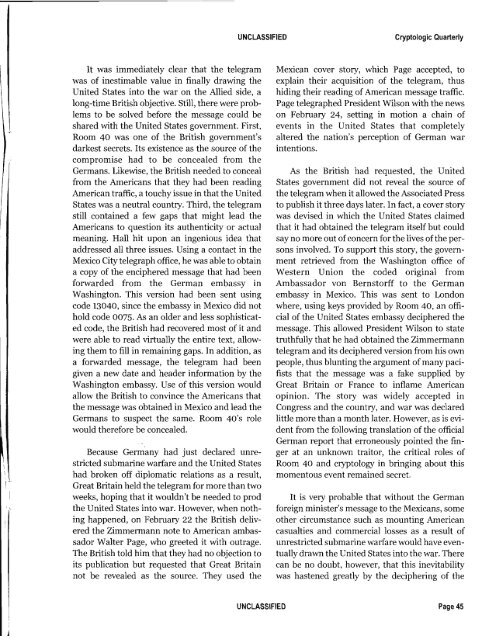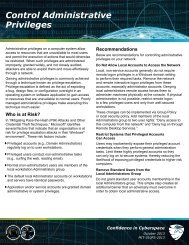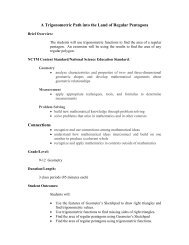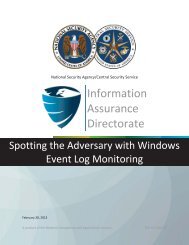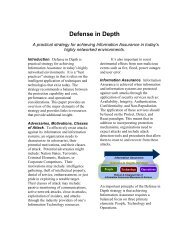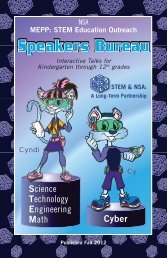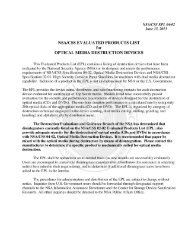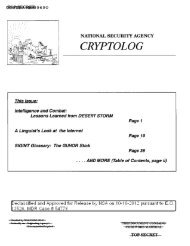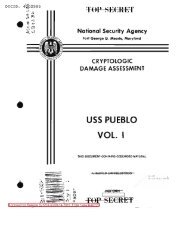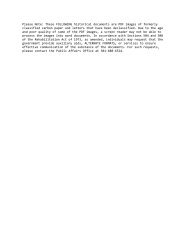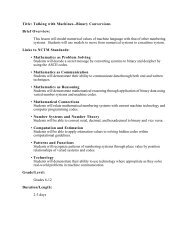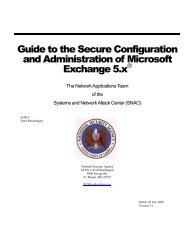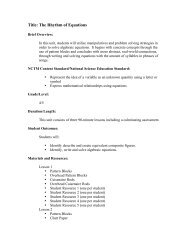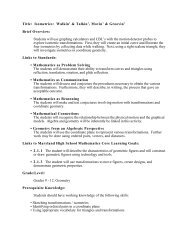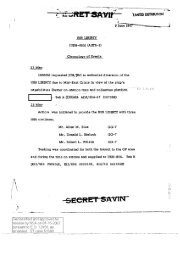The Zimmermann Telegram - National Security Agency
The Zimmermann Telegram - National Security Agency
The Zimmermann Telegram - National Security Agency
Create successful ePaper yourself
Turn your PDF publications into a flip-book with our unique Google optimized e-Paper software.
It was immediately clear that the telegram<br />
was of inestimable value in finally drawing the<br />
United States into the war on the Allied side, a<br />
long-time British objective. Still, there were problems<br />
to be solved before the message could be<br />
shared with the United States government. First,<br />
Room 40 was one of the British government's<br />
darkest secrets. Its existence as the source of the<br />
compromise had to be concealed from the<br />
Germans. Likewise, the British needed to conceal<br />
from the Americans that they had been reading<br />
American traffic, a touchy issue in that the United<br />
States was a neutral country. Third, the telegram<br />
still contained a few gaps that might lead the<br />
Americans to question its authenticity or actual<br />
meaning. Hall hit upon an ingenious idea that<br />
addressed all three issues. Using a contact in the<br />
Mexico City telegraph office, he was able to obtain<br />
a copy of the enciphered message that had been<br />
forwarded from the German embassy in<br />
Washington. This version had been sent using<br />
code 13040, since the embassy in Mexico did not<br />
hold code 0075. As an older and less sophisticated<br />
code, the British had recovered most of it and<br />
were able to read virtually the entire text, allowing<br />
them to fill in remaining gaps. In addition, as<br />
a forwarded message, the telegram had been<br />
given a new date and header information by the<br />
Washington embassy. Use of this version would<br />
allow the British to convince the Americans that<br />
the message was obtained in Mexico and lead the<br />
Germans to suspect the same. Room 40's role<br />
would therefore be concealed.<br />
Because Germany had just declared unrestricted<br />
submarine warfare and the United States<br />
had broken off diplomatic relations as a result,<br />
Great Britain held the telegram for more than two<br />
weeks, hoping that it wouldn't be needed to prod<br />
the United States into war. However, when nothing<br />
happened, on February 22 the British delivered<br />
the <strong>Zimmermann</strong> note to American ambassador<br />
Walter Page, who greeted it with outrage.<br />
<strong>The</strong> British told him that they had no objection to<br />
its publication but requested that Great Britain<br />
not be revealed as the source. <strong>The</strong>y used the<br />
UNCLASSIFIED Cryptologic Quarterly<br />
Mexican cover story, which Page accepted, to<br />
explain their acquisition of the telegram, thus<br />
hiding their reading ofAmerican message traffic.<br />
Page telegraphed President Wilson with the news<br />
on February 24, setting in motion a chain of<br />
events in the United States that completely<br />
altered the nation's perception of German war<br />
intentions.<br />
As the British had requested, the United<br />
States government did not reveal the source of<br />
the telegram when it allowed the Associated Press<br />
to publish it three days later. In fact, a cover story<br />
was devised in which the United States claimed<br />
that it had obtained the telegram itself but could<br />
say no more out ofconcern for the lives ofthe persons<br />
involved. To support this story, the government<br />
retrieved from the Washington office of<br />
Western Union the coded original from<br />
Ambassador von Bernstorff to the German<br />
embassy in Mexico. This was sent to London<br />
where, using keys provided by Room 40, an official<br />
of the United States embassy deciphered the<br />
message. This allowed President Wilson to state<br />
truthfully that he had obtained the <strong>Zimmermann</strong><br />
telegram and its deciphered version from his own<br />
people, thus blunting the argument of many pacifists<br />
that the message was a fake supplied by<br />
Great Britain or France to inflame American<br />
opinion. <strong>The</strong> story was widely accepted in<br />
Congress and the country, and war was declared<br />
little more than a month later. However, as is evident<br />
from the following translation of the official<br />
German report that erroneously pointed the finger<br />
at an unknown traitor, the critical roles of<br />
Room 40 and cryptology in bringing about this<br />
momentous event remained secret.<br />
It is very probable that without the German<br />
foreign minister's message to the Mexicans, some<br />
other circumstance such as mounting American<br />
casualties and commercial losses as a result of<br />
unrestricted submarine warfare would have eventually<br />
drawn the United States into the war. <strong>The</strong>re<br />
can be no doubt, however, that this inevitability<br />
was hastened greatly by the deciphering of the<br />
UNCLASSIFIED Page 45


